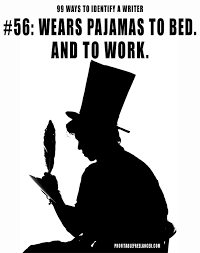 It’s funny how many writers are embarrassed of the UPS guy finding them in PJs in the middle of the day.
It’s funny how many writers are embarrassed of the UPS guy finding them in PJs in the middle of the day.
In a recent article in The New York Times, Evan Hughes writes about the rise of the Writers’ Space, which is exactly what it sounds like: a space for writers to work, “a cocoon that protects its inhabitants from a world where most people regard writing, with some reason, as a peculiar and dubious hobby.” Working at a Writers’ Space, you can avoid the embarrassment of the UPS guy coming and thinking, in Hughes words, this guy just writes all day?
“There is something embarrassing about working from home,” Hughes says. Comparing the writers’ space with the gym, he continues: “you feel less ridiculous spending your time on an activity with uncertain and elusive benefits: everyone else is doing it, too.”
The author Dani Shapiro has worried about this too. In her wonderful writing memoir, Still Writing: The Perils and Pleasures of the Creative Life, she writes: “I can’t imagine what my UPS delivery guy thinks when I crack open the door to sign for a package. There’s that weird lady again.”
She continues, “People look at us funny, very possible because we look funny, strange, out of sync with the rest of the world after spending days alone in our bathrobes, talking only to our household pets, if at all.”
It seems many writers have dealt with this embarrassment, this unease, this socially perplexing issue of writing. Recently, I quit my 9-5 job and, for the time being, I appear to be writing full-time. This doesn’t mean “writing” in an abstract way – when inspiration strikes, or when I’m in the mood to scribble down some snippets. I mean writing every day, at my desk. Working. People don’t seem to understand this approach to spending your time, and, by extension, to living your life.
While ‘working’ at a coffee shop a few days ago, I ran into an acquaintance. He asked, as expected, what I was up to. I told him, and went at great lengths to explain that I am now trying to write. He nodded as if he understood, and encouraged by this, I went on. He gets it. After all, he was trying to delve into entrepreneurship himself. He knew what it was like to work outside the ease of a 9-5 job.
I was wrong.
So, you’re writing, he said. But what else?
What else.
As if novels are written while dreaming. Thinking, and putting down words on paper can’t possibly take up all your time.
A writer has a weird job, and despite all the books out there, it is not one that is universally accepted as normal. Not if it’s the only thing you do and you have nothing to show for it. In a chapter titled Permission, Shaprio writes: “Accountants go to business school and when they graduate with their degrees, they don’t ask themselves whether they have permission to do people’s taxes. Lawyers pass the bar, medical students become doctors, academics become professors, all without considering whether or not they have a right to be going to work. But nothing and no one gives us permission to wake up and sit at home staring at a computer screen while everybody else sets their alarm clocks, puts on reasonable attire, and boards the train. No one is counting on us, or waiting for whatever we produce.”
Ultimately, I guess, writers can only give themselves the permission to be writers and everyone else can go do whatever they want with their lives. Writers must go on writing. We must get over the feeling of “getting away with something” and get to work and understand that the writing life is a privilege, and not everyone gets to have it. If I have to wrestle with a few “what else?” questions, then so be it.

[…] you spending your days doing, anyway? Sure, writers have the freedom to shape their days. You can work in your pajamas, in your kitchen, at a coffee shop. But this freedom comes at a […]
LikeLike